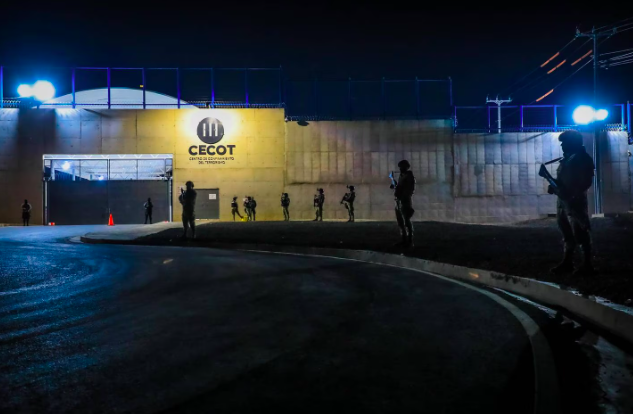The Salvadoran government recently celebrated 365 non-consecutive days without homicides, a fact it called unprecedented in Central American history.
The “iron fist” strategy, as part of the “War on Gangs” and the emergency regime that the country has been implementing since March 2022, has led to the arrest of 68,500 people whom the authorities call terrorists because of their alleged links to criminal structures.
Of that total, at least 1,000 are gang leaders, according to Gustavo Villatoro, head of the Ministry of Justice and Security.

However, 7% of those captured, equivalent to 5,000 people, have been released because they are not linked to gang groups, the official said in a television interview.
As part of the plan, last February, the government set up the Terrorism Confinement Center (CECOT), a mega-prison with a capacity for 40,000 people “who will be cut off from the outside world”.
The images of the transfers of the inmates, who are seen barefoot, with shaved heads, naked torsos, bent over and handcuffed, circulated the world.
Colombian President Gustavo Petro described the prison as a “concentration camp”, a criterion that caused several confrontations between the presidents of both countries on Twitter.
BUKELE’S POPULARITY
Bukele, 41, enjoys popularity inside and outside his country.
The latest Dataworld poll places him with an approval rating of 91% (92%, according to CID Gallup), more than any other president in the region.
His image as a ‘cool’ millennial president who boasts of turning El Salvador into the safest country in Latin America has attracted people from all over the world who are overwhelmed by crime and violence.
PRESIDENTIAL APPROVAL (Dataworld)
🇸🇻Bukele 91%
🇮🇳Modi 78%
🇩🇪Scholz 63%
🇩🇴Abinader 61%
🇲🇽AMLO 58%
🇺🇾Lacalle 47%
🇹🇷Erdogan 45%
🇧🇷Lula 44%
🇮🇹Meloni 44%
🇺🇸Biden 42%
🇪🇦Sánchez 37%
🇨🇦Trudeau 36%
🇯🇵Kishida 30%
🇨🇱Boric 30%
🇨🇴Petro 30%
🇬🇧Sunak 28%
🇮🇱Netanyahu 28%
🇨🇵Macron 25%
🇦🇷Fernández 22%
A survey made by Datexco for W Radio published this week showed that 67% of 700 Colombians surveyed agree with the mega-prison; meanwhile, 55% of those interviewed responded that they would like a president like Bukele for Colombia and 26% answered that they would not like one.
José Antonio Potes Cáez, 27 years old, a native of Valle del Cauca, traveled to El Salvador to work and help his family economically after having the illusion of the quality of life that Bukele says there is in El Salvador.
However, he was imprisoned in the Central American country for three months after Salvadoran authorities accused him of being a “marero” because of a tattoo on his chest.
His relatives in Colombia alerted him about the case, which caused media pressure and viralization in networks, eventually leading to his release by the Salvadoran authorities.
When he returned to his country on April 30, he told the television news program Noticias Uno that he was forced to say that he had not been sent to jail because he was accused of belonging to a gang.
After his situation in El Salvador became known, Semana magazine revealed an exclusive video in which the young man denied that he was imprisoned for being a gang member, but his version changed when he returned to his country.
“What (I affirmed) was as they told me. The clothes I’m wearing are the same ones I left prison with, the ones they bought me,” said Potes Cáez.
ALLEGATIONS OF DEATHS IN CUSTODY
Regarding the case of the Colombian, the Salvadoran criminal lawyer Lucrecia Landaverde assured that “it is a modus operandi of this institutionalized crime, where the victims are threatened when they come out (of prison) and cannot speak, cannot give statements to the press”.
While participating in a space developed by the political organization Movimiento Libertad, Landaverde added that he has “many defendants who are afraid to speak”.
Ingrid Escobar spoke at the same forum, representing Socorro Jurídico Humanitario.
This institution arose from the arbitrary acts in the execution of the regime of exception “that has cost Salvadorans at least 20,000 innocent people captured suffering any humiliation and torture inside penal centers”.
In addition, according to the initiative, about 200 violent deaths due to medical negligence, among others, inside prisons “and that is something we cannot keep quiet about. Our institution was born precisely because fundamental human rights were violated”, said Escobar.
For its part, the organization Cristosal reported 132 deaths in the custody of the Salvadoran state in the first year of the regime, and of these, 94% of the detainees who died had no links to gangs.
The Movement of Victims of the Regime has compiled hundreds of cases of people who have been detained for months allegedly for illicit association and others who have died in custody, such as Alfredo Isaías Andrade Martínez, who died on April 29 in the Santa Ana prison.
The forensic report indicates that the cause of his death was intoxication or asphyxiation. However, the family observed blows to his back and stomach.
PROPAGANDA PHENOMENON
In an opinion column, Chilean journalist and editor Carolina Vásquez Araya said:
“We are observers of one of the most shocking propagandistic phenomena of recent times: the collective dazzle before a skillful campaign, whose purpose is to turn an emerging dictator into one of the most popular leaders of the decade”.
Bukele called himself a ‘dictator’ in September 2021 when he changed his Twitter biography as an ironic response to organizations’ claims for the increasing concentration of power.
🇸🇻| El 77% de los Salvadoreños aprueban la reelección del Presidente Nayib Bukele. ¿Te gustarían 5 años más de Bukele como Presidente de El Salvador?
Si a la reelección de Bukele ♥️
Sin duda alguna 🔄
No y ¿por qué? 📝 pic.twitter.com/ZzeurlbEES— Eduardo Menoni (@eduardomenoni) May 15, 2023
With information from Bloomberg
News El Salvador, English news El Salvador, El Salvadorian politics

